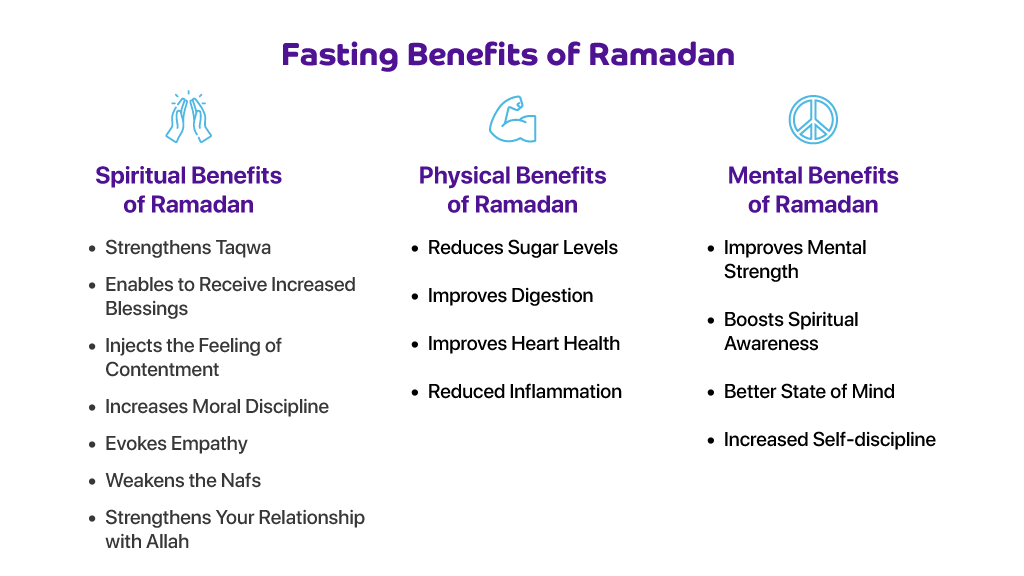Home » Cashless Payments Knowledge Hub » Ramadan 2023: Benefits and Spiritual Importance of Fasting

During the ninth month of the Islamic calendar, called Ramadan, participants fast and abstain from things considered impure for the mind and body.
Ramadan participants observe fasting between sunrise (Fajr) and sunset (maghrib), allowing them to focus on prayer and connecting with Allah instead. This process has the potential to change behaviors and shape life patterns in ways that benefit our entire environment.
Participants can understand how their environment and themselves are sustained when they focus on work on an empty stomach.
Angel Jibril revealed the Qur’an to Prophet Muhammad (PBUH) while on his retreat in the Cave of Hira.
It was when the first five verses of Surah Al-Alaq were revealed. In addition, several hadiths mentioning Ramadan show its importance, such as,
| “During Ramadan, Paradise’s gates are opened, Hell’s gates are closed, and demons are chained.” |
Ramadan is significant because participants fast for 30 days during this religious season to develop a much more intimate and deeper relationship with Allah.

Taqwa is an Islamic term that means “piety and dread of God” and refers to being aware of Allah and the truth. The holy book of the Quran frequently mentions the term.
It conveys a strong sense of being wary of one’s life and actions, as the angels are constantly on the lookout. Fasting also improves one’s ability to be mindful of Allah and avoid unintentional offenses against His ways. As a result, people have led from sins and wrongdoings.
During Ramadan, all capable participants must fast. It is said that Allah bestows great rewards and blessings on fasting participants. Every hour of fasting brings people closer to Allah in the afterlife. However, instead of fasting for the gifts, one should focus on their significance and value.
Food holds significant emotional importance in many people’s lives.
People seem to turn to food to either reward themselves or help them feel better when they are upset, angry, stressed, or even happy. As a result, the purpose of food – to feed – has been replaced with other purposes, resulting in an unhealthy relationship with it.
The separation of humans & food for 30 days allows them to break the habit of turning to food. Instead, participants can reward themselves or fill this void by exercising, writing, reading, praying, reading the Quran, and so on. They can now see different mediums that will help them create a feeling of content because the perspective has been forced to shift.
No one will notice or find out if you quietly eat or drink something. However, the fasting person has made this commitment for Allah’s sake, and they wish to protect the purity of their fast for Allah’s sake.
Fasting teaches discipline and sincerity and how to live by the principles of their faith regardless of whether others know. Fasting also acts as a test of self-control. It is a good way to break the habit for those chain smokers who constantly nibble on food or drink coffee every hour.
Also, read Ramadan 2023: Consumer Trends in UAE
Fasting during Ramadan necessitates a greater effort to perform all normal duties, prayers, and charity while abstaining from food and drink. Fasting recalls the poor’s hunger and starvation and fosters empathy for those in need.
It allows people to experience hunger even though they can understand the plight of the hungry and take action to help them.
The Nafs are part of a person that drives them to act on their animalistic desires. It is up to everyone to control and overcome these desires. Imam Ghazali writes that physical comforts, such as food and drink, are a source of strength for the Nafs.
The logical conclusion is that depriving the physical body of food and drink weakens the Nafs and, thus, its ability to invite the individual to evil and sin also weakens.
During the month of fasting, they must abstain from all food and liquid, as well as lying, cheating, backbiting, gossiping, false witnessing, and other bad habits. During the month of fasting, people set aside food and other distractions to focus on developing a closer relationship with God.
Each Ramadan celebration brings people so close to Allah that it becomes more natural to abandon the bad habits people consciously try to avoid during Ramadan. As a result, people become better persons each year of Ramadan.
Fasting during Ramadan can help you lose weight, especially if you stick to a healthy diet during the non-fasting hours. You can reduce your calorie intake and increase your physical activity to shed excess weight and improve your sugar levels.
During Ramadan, the body’s digestive system gets a much-needed break, which can lead to improved digestion. Fasting allows the body to focus on repairing and rejuvenating the digestive system, which can result in better nutrient absorption and a healthier gut.
Also, read Pre-Ramadan Checklist for Every Household
Fasting has been shown to lower high blood pressure, which is good news for those with hypertension. The reduction in blood pressure is likely due to decreased salt intake and reduced cholesterol in food during fasting.
Fasting can help reduce inflammation in the body, which is linked to several chronic diseases, including heart disease and arthritis. By reducing inflammation, fasting can help lower the risk of these diseases.
Fasting during Ramadan can help improve mental clarity and focus, which helps strengthen your mental abilities. Reducing food intake can help clear the mind and improve cognitive function.
Ramadan is a time for spiritual reflection and increased mindfulness. Fasting can help increase spiritual awareness and deepen our connection to ourselves.
Fasting has been shown to improve mood and reduce stress levels. This is likely due to the release of endorphins during fasting, which can help improve our overall sense of well-being.
Fasting requires self-discipline and self-control, which can translate into other areas of our lives. Practicing self-discipline during Ramadan can improve our ability to resist temptation and make healthier choices.
During Ramadan’s last ten days, people are encouraged to meet with Allah for special prayers called Layat-ul-Qadr before dawn. In conclusion, fasting during Ramadan has numerous physical and mental benefits. From weight loss to improved mental clarity, fasting can help improve our overall health and well-being.
Praying on these nights is equivalent to praying for a thousand months in Islam. Moreover, the rewards for giving sadaqah (charity) during Ramadan are multiplied by 100s, encouraging participants to do more good deeds and acts of kindness. These enormous rewards make them feel immense gratitude and consciousness toward God.
Buy gifts, transfer funds, and split bills with friends with just a few taps on your phone. Download Payit digital wallet app now.
